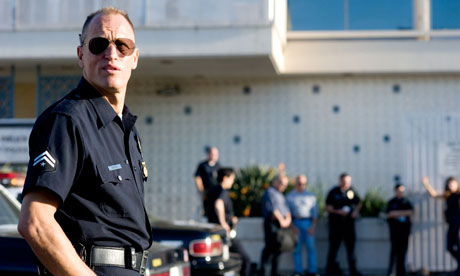
Woody Harrelson became famous 30 years ago when, still in his early 20s, he joined the cast of the TV comedy series Cheers as the goofy, grinning bartender Woody Boyd from Hanover, Indiana. He seemed to be a simple, friendly small-town boy, somewhat out of his depth in the big city. During the 1990s his public and private personae rapidly changed. He became known as a reckless hard drinker and an outspoken political activist, whose father was a contract killer serving a life sentence for murdering a federal judge. On screen he played increasingly complex and darker roles, some of them bizarre variations on the Woody character (basketball hustler in White Men Can't Jump; psychotic criminal in Natural Born Killers), others reaching out in quite different directions (the pornographer with a civil rights mission in The People vs Larry Flynt; the gay Washington gigolo in The Walker). Ingratiation with popular audiences has never been a primary aim, and in Rampart, his second collaboration with Oren Moverman, who directed him in the highly regarded Iraq war veteran movie The Messenger, he has taken on his most difficult part to date.
The movie takes its title from the multicultural Rampart district of downtown Los Angeles, the most densely populated area of America west of the Mississippi, and it's set in 1999 when the local police force was under investigation for racism, violence, bribery, drug dealing and general malfeasance. The Los Angeles police have come a long way cinematically since the early 20th century when the Keystone Kops patrolled the city.
Harrelson plays Dave Brown, a uniformed policeman of 24 years' standing, himself the son of a cop, and he's an emblematic figure in this culture of corruption, though precisely what he represents remains undefined. He's at the centre of every scene in the film, and we meet him driving his patrol car through Rampart, physically trim, his head shaven, his uniform neatly pressed, a cigarette permanently dangling from his lip. He's apparently Woody the barman working for the LAPD, with the familiar high cheekbones, the Roman nose, the Mr Punch-like jaw, the half-smile that might be vacant, searching, mocking or hinting at violence.
Very soon Brown is out of his car talking to a pair of junior cops, and his talk gets casually racist. He rejects the existence of an ongoing scandal when the matter is raised by a policewoman and then orders her to eat the box of takeaway chips she's ordered but not touched. Has this something to do with discipline, with diet, with arbitrary authority? We're not told, though we later learn that Brown never eats. At every juncture what we learn about this easy-going charmer is designed to make him appear a troubled, contradictory character whose private and professional lives are equally messy.
He's a heavy-drinking womaniser who has a young daughter with each of his ex-wives (Anne Heche, Cynthia Nixon), who in addition to living next door to each other are also sisters. His record of arrests and convictions is high, but he has a sorry reputation for abusing blacks and Hispanics, framing suspects, and even for homicide. Within the force his dubious sobriquet is "Date Rape", which derives from the unproven charge that he murdered a sex offender, presumably motivated by concern for his own daughters. As the movie progresses he's filmed beating the driver of a car that crashes into him. This becomes a major news story. Brown later steals money from thieves after a tip-off about a heist: he needs to pay for the lawyers defending him against investigators from the District Attorney's office and the LAPD's own internal affairs department.
This is a brilliant portrait of that familiar figure, the flawed law enforcement officer dedicated to the public order, corrupted by the foul world he lives in and at the end of his tether. He first became a major Hollywood character in the years after the second world war – Kirk Douglas in Detective Story, Dana Andrews in Where the Sidewalk Ends, Orson Welles in Touch of Evil. More recently we've had examples in Europe: Gérard Depardieu in Maurice Pialat's Police, Gian Maria Volonté in Elio Petri's Investigation of a Citizen Above Suspicion. This is very much the territory of James Ellroy, a crime writer who combines finesse and brutality in his thrillers about the Los Angeles police. In Rampart, his first original screenplay to reach the screen, Ellroy is struggling with his own demons, and the result is forceful if somewhat blurred, and narrower in focus than Curtis Hanson's excellent film of Ellroy's LA Confidential.
Harrelson's Brown is paranoia and self-justification personified, a man torn between retribution and redemption, driven to suspecting everyone around him and using his formidable knowledge of the law to baffle his antagonists and provide a cloak of innocence. "I never hurt any good people," he claims, adding: "I'm not a racist, I'm just against everyone – equally." The whole style of the film reflects the moral climate of his world: a handheld camera that catches Brown's edgy rhythms, the natural lighting that places him in dazzling daylight or murky darkness. The presence of Brown centre stage surrounded by forceful actors who briefly appear to hurl threats and accusations makes him look like a man under constant interrogation. It confirms Harrelson's position as one of the best, most ambitious, least self-regarding actors at work today, and by the end he's compelled us to understand Brown and accord him a grudging respect.

